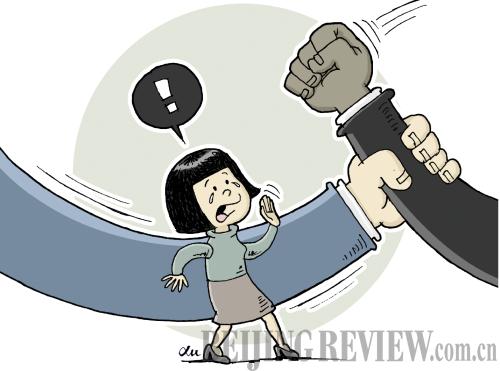|
 |
|
(XU JUN) |
Everyone is probably familiar with stock cultural figures of the Tiger Mom, or the obnoxiously loud, pushy sports-obsessed dad. If you are a Westerner and have participated in Little League Baseball as player, fan, or coach, you will know the scene only too well: a parent publicly berating his or her youngster for a lackluster performance. Sympathetic onlookers know better than to intervene, preferring to avoid the toxically unpleasant atmosphere generated.
Sports coaches have long become desensitized to the explosive nature of summertime sports-related craziness which, in most instances, is evidenced by parents throwing tantrums, unleashing their anger and spewing venom toward umpires, coaches, and children, all of whom are doing their best to simply try to play the game and enjoy themselves in the spirit of fair play, camaraderie, and above all, sportsmanship.
A cursory examination of parenting styles, however, reveals none-too-subtle approaches when it comes to the actual molding of the minds and character of young people. A recent case of what could be termed "strong-arm parenting" caught the attention of media nationwide in the United States when a popular Major League sports figure was charged with criminal child abuse. This parent had struck his child with a wooden birch as a method of discipline.
I would wager that this particular parent had been raised in the same manner by his parents, and would further venture to say that the older parents most likely held firm in their belief of "correctly" teaching their children good behavior and values, having read in the Holy Bible that "to spare the rod is to spoil the child." I am familiar with this particular piece of philosophy, having myself been raised in a very strict Christian family. My father often lauded the methods used by his own parents on him when he was a child, informing us that his methods were far less severe. He would bellow, "Be thankful that I am not using the 'cat-of-nine-tails' to whip you!"
Furthermore, from a worldwide cultural standpoint, it has been documented that in the Russian state prisons on Sakhalin Island, flogging was considered a rudimentary method for leaving lasting impressions—both literal and figurative—on exiles held to be no longer worthy of living on the Russian mainland.
Additionally, only a few years ago, the world's attention was directed at the country of Singapore, where Westerners were upset when the traditional punishment of caning was carried out against an American who had violated the local laws. This beating was thought to be barbaric. The prevailing wisdom held that a physical beating being inflicted on a Westerner was indeed preposterous. After all, Westerners are allegedly exemplars of a culture presumed to represent the pinnacle of civilization. Implicit in this thinking is a view that Westerners would never practice such barbarism themselves.
Little attention, however, is paid to the fact that even in supposedly civilized cultures, where laws on the books exist to prevent the abridgement of personal rights and safety, persons duly convicted of having perpetrated heinous crimes may find themselves locked behind closed doors or in isolated cell rooms, places where "confessions" are extracted by nothing less than corporal means.
Even in Europe and North America, children did not always historically have protection from physically abusive parents or from forced labor. Today, it is not surprising that parents continue, in some countries, to kill or maim their children for acts of disobedience. Clearly, children must be protected, and in many countries, there is thankfully a growing recognition of the basic rights of children to protection from harm and abuse.
Yet, the slow historical evolution in attitudes away from the employment of force and corporal measures on human beings, whether the whip is a single strap, or many cords, has meant that such practices have finally been acknowledged at least by some to be inhumane. The sad fact remains, however, that even in today's "civilized" West, a majority of parents still have not given up the idea that striking a child is the best means to obtain the desired result in the quickest possible fashion, although continued positive outcomes thereafter are not guaranteed or lasting. One can only hope that future generations of parents will break this self-perpetuating cycle of the use of force.
The author is an American living in Beijing |
